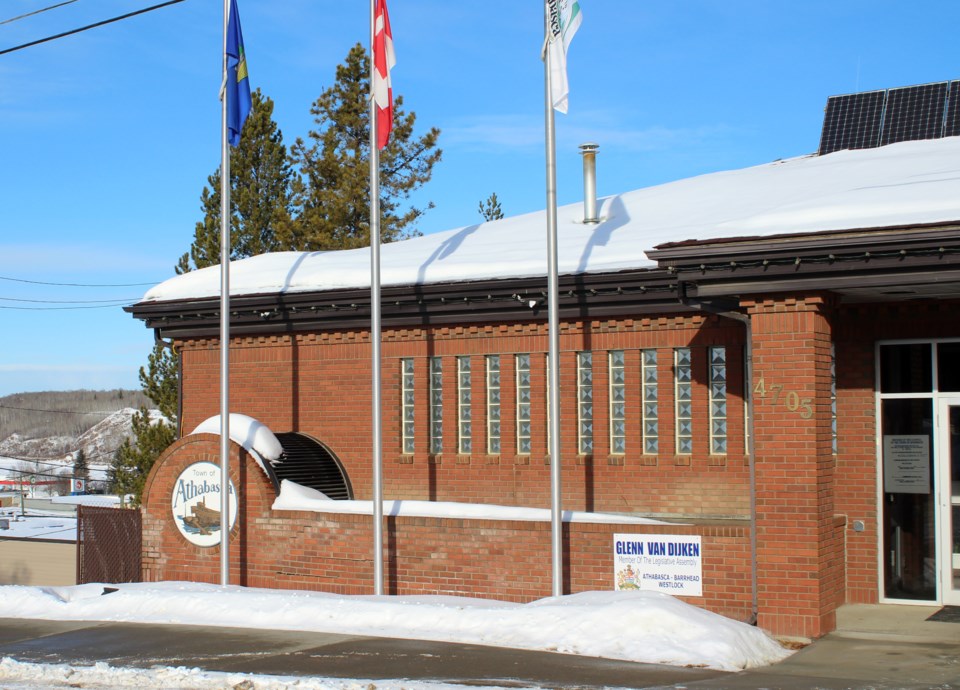ATHABASCA – Residential and commercial property owners in the Town of Athabasca will have to dig a little deeper into their pockets this year as town councillors have approved a 2.5 per cent tax increase.
With little discussion at their March 21 meeting, councillors voted 7-0 to adopt the 12-page 2023 operating budget as mayor Rob Balay noted that it was a “short and sweet” item on the agenda, given the amount of work that had already been done. Town taxes are due annually at the end of June, while the official mill rate bylaw is expected to be passed by councillors next month.
The 2.5 per cent increase will be applied to the mill rate, which will jump from 8.72 to 8.94 per cent. In a follow-up interview, CAO Rachel Ramey noted that if a ratepayer’s property is valued at $200,000, they will see an increase of roughly $43.63 on their yearly tax bill, while if the property is worth $400,000, the annual change would be an extra $87 — the town also collects on behalf of the province for the Alberta School Foundation Fund and the seniors lodge requisition but does not set those rates.
Balay called the budget process collaborative with administration, noting they establish goals “that are part of our overall strategic plan, and our budget is based off of that” while also drawing attention to municipality’s 10-year capital replacement plan, “which we try and follow as closely as we can.”
“Although we’re going to raise taxes by 2.5 per cent for both residential and commercial, we also wanted to try some things, so that’s why we created the tax incentive bylaw. We want to try and find some incentives that will bring business to town as we can’t just keep raising taxes. We have to rely on some growth, so we’re trying to grow ourselves out of this, instead of tax our way out of it,” said Balay.
“I think we were all on board with the approach, we of course had some disagreement on some things, but in the end when we came together as a group we agreed on things.”
Inflation has also played a part in raising taxes, with the mayor noting that utility costs had gone up from 2022. There will be a two per cent franchise fee increase on services from Fortis and Apex, which will impact all users, including tax-exempt entities like hospitals, schools, and churches.
Also, changes made by the water commission, which has gone to a flat rate, will impact all users. Water purchases cost the municipality $953,182.10 in 2021 and $1,439,442.91 in 2022, while the town has budgeted $1,362,691 for 2023. While this number is $76,751.91 lower than 2022, the town had only budgeted $1,196,500 for the purchases in 2022, going over-budget by $242,942.91. The town has implemented a $12.50 water distribution fee for this year, which residents will receive on their bills. Fees for water will also increase by 7.5 per cent with the average family seeing their water bill increase by $3.22, or $38.58 over the entire year.
Besides the increased water costs, the operating budget remains similar to last year, although there are some new programs. This will be the first year for the $2,000 Dr. Brown Scholarship that will be available for students interested in a career in healthcare. There’s also a $15,000 allotment for the attraction and retention of healthcare workers, which will work side by side with other programs as the region continues to look for ways to attract more healthcare professionals.
In total, the town is expecting to reap $5,604,763.00 from taxes in 2023, an increase of $243,643, or roughly 4.35 per cent — the tax hike account for $170,946 of that amount, with another $32,587 expected to come from an increased return on the investments.
The municipality will spend $256,100 on the various council expenses this year, a 26.40 per cent increase from the previous year. Much of this comes from $65,000 budgeted for strategic initiatives, a substantial jump over $26,000 spent in previous years. In terms of council expenses, each gets $20,000 in pay, with Balay receiving $6,500 more due to the increased demands on his position.
The town is expecting to pay $107,674 on administrative costs in the current budget which would be 31.47 per cent less than they did in the past year. Policing is also expected to cost $170,152 this year, a 34.55 per cent increase over years prior. While this number should remain the same in 2024, it is a sharp jump over 2022, when the town paid $116,350.
This year’s capital budget is $1,300,000, roughly half of which is earmarked for public works projects. One notable change here has been the funding for the Rupert Reservoir; while councillors had initially planned on taking out a $350,000 debenture from the provincial government, during their final budget meetings they decided that the loan was no longer required, and the project will be funded by monies received from the province.
Other major capital projects this year include the Wood Heights Road, which will receive $350,000, and the industrial park, which has $175,000 set aside for it in the budget.



